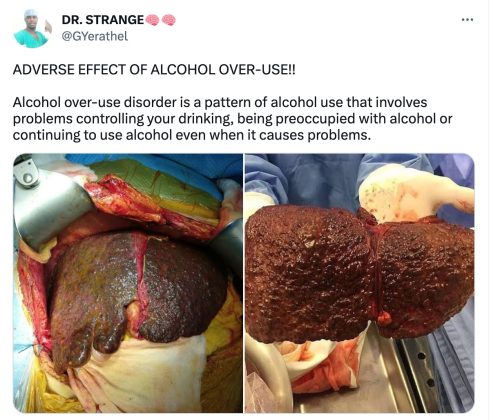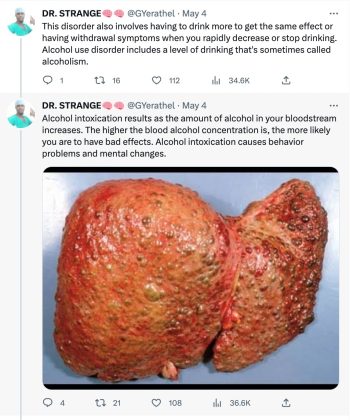Alcohol is an intriguing substance. On one hand, it’s been used throughout human history as a social lubricant and a source of pleasure. On the other, it’s a potent toxin that can cause significant harm when consumed in excess. To understand the full spectrum of alcohol’s effects on human health, it’s essential to recognize its dual nature and consider it as it truly is: a poison.
The Biochemistry of Alcohol: How It Works
To understand why alcohol is a poison, we first need to delve into the biochemistry of alcohol metabolism. Ethanol, the active ingredient in alcoholic beverages, is metabolized in the liver. The enzyme alcohol dehydrogenase (ADH) converts ethanol into acetaldehyde, a highly toxic compound and known carcinogen. The acetaldehyde is then further metabolized by another enzyme, aldehyde dehydrogenase (ALDH), into acetate, a relatively non-toxic substance which is eventually broken down into water and carbon dioxide.
The problem arises when the rate of alcohol consumption exceeds the liver’s capacity to metabolize it. The accumulation of acetaldehyde causes harmful effects, such as facial flushing, nausea, rapid heart rate, and headache. This is a clear indication of the body’s response to a poison. Over time, repeated exposure to acetaldehyde can lead to more serious conditions, such as liver damage, cardiovascular disease, and cancer.
Health Impact of Alcohol Consumption
The consumption of alcohol, especially in excessive quantities, can lead to numerous health problems.
Liver Disease
The liver is the primary organ responsible for metabolizing alcohol. Excessive drinking can cause alcoholic liver disease, which can progress from fatty liver to alcoholic hepatitis, and eventually to cirrhosis, a condition where the liver is so scarred it cannot function properly. Cirrhosis can lead to liver failure, a life-threatening condition.
Cardiovascular Problems
Moderate drinking might have a protective effect on the heart, especially red wine due to its antioxidant resveratrol. However, heavy drinking can increase the risk of high blood pressure, heart failure, and stroke. It can also cause cardiomyopathy, a potentially deadly condition where the heart muscle weakens and can’t pump blood effectively.
Cancer
Alcohol is a known carcinogen. It increases the risk of several types of cancer, including mouth, esophagus, throat, liver, and breast cancer. The risk of cancer rises with the amount of alcohol a person drinks.
Mental Health Issues
Alcohol affects the central nervous system and can contribute to mental health problems, such as depression and anxiety. Heavy drinking can lead to alcohol dependence or addiction, and withdrawal can cause severe symptoms, including tremors, hallucinations, and even seizures.
Other Health Risks
Other risks associated with alcohol include pancreatitis, a severe inflammation of the pancreas, and damage to the brain, leading to memory loss and dementia over time. It can also weaken the immune system, making the body more susceptible to infections.
In Conclusion: Alcohol as a Poison
Recognizing alcohol as a poison is not to stigmatize its consumption entirely. Many people enjoy alcohol responsibly and in moderation without significant health problems. However, understanding its toxic nature can help us make informed decisions about our drinking habits.
The key to alcohol consumption is moderation. The Center for Disease Control and Prevention (CDC) defines moderate drinking as up to one drink per day for women and up to two drinks per day for men. Regularly drinking more than these amounts can increase the risk of health problems.
Remember, each person’s response to alcohol varies, and some people should avoid alcohol entirely, including pregnant women, people with certain medical conditions, individuals taking specific medications, those with
a history of addiction, and anyone under the legal drinking age. These individuals are at a higher risk for the negative health effects of alcohol.
When we view alcohol through the lens of it being a poison, we can better appreciate the health risks associated with its consumption. Alcohol’s potential to harm our bodies is significant. Excessive drinking can lead to serious health problems, from liver disease and cancer to mental health disorders and cardiovascular complications. Moreover, alcohol can also have a detrimental impact on the lives of those around us, contributing to domestic violence, accidents, and societal issues.
At the same time, understanding that alcohol is a poison doesn’t necessitate complete abstinence for everyone. Rather, it underscores the importance of responsible drinking. It’s crucial to stay within recommended limits, to not drink when you’re pregnant, underage, or in situations where you’ll be driving or operating heavy machinery. If you find it challenging to moderate your drinking, it’s important to seek help.
The goal of this article is not to frighten but to educate. By understanding the full impact of alcohol on our health, we can make better decisions about our consumption. Being aware of the potential harm of alcohol allows us to respect its power and treat it with caution. This awareness can protect our health, enhance our well-being, and contribute to a safer society.
In conclusion, while alcohol might have a place in social settings and certain cultural practices, we must not overlook its nature as a poison and the potential harm it can cause. Being aware of this fact and taking necessary precautions can lead to healthier choices and better overall health. Remember, your health is invaluable, and making informed decisions about alcohol consumption is key to maintaining it.









